The Illusion of Victory: America in World War One
- Home
- World War I Book Reviews
- The Illusion of Victory: America in World War One

By Thomas Flemming
ISBN 0-465-02467-X. H/B, 543 pages
In his inimitable style, Thomas Fleming has written a dramatic story of Presidential hubris in wartime. It is a cautionary tale for any contemporary national leader. It traces the process by which Woodrow Wilson’s disdain for dissident opinions, his naiveté, and his faith in his own rhetoric isolated him from political reality.
The author begins the story with a dissection of Wilson’s personality on the eve of the American declaration of war in April 1917. By then, Fleming explains, the President’s misplaced faith in the persuasive power of his own speeches masked the fact that he had no idea how the United States should fight its war. Indeed, he had persuaded himself that few American soldiers would ever have to go to France. Surely, the U.S. Navy could guarantee the safe arrival of his preferred American contribution: munitions.
As the story unfolds, the author shows how Wilson’s disrespect for other opinions in Congress, in his own Cabinet, in the press, and in both Democratic and Republican parties so isolated him from political reality at home and abroad that he saw the world through the lenses of abstract ideals: the world as it should be, not as it was. Inevitably, he was often confused about facts that refused to validate his own vision. Split-minded, he could vacillate whimsically on almost every political issue. Finally, his impatience would reveal his preference for raw power, especially military force, in hopes of a quick solution. Thus would he advocate high-flown principles only to betray them with his own opportunism. Among many stories to footnote that indictment, the author offers persuasive details.
Perhaps most damning, he deliberately betrayed his high-principled commitment to the Constitution and the democratic process for 14 months after he suffered a cerebral thrombosis in October 1919. He colluded with his wife, Edith, and his physician, Grayson, to deceive the country about the true nature of his mental and physical malaise.
Principles of Wilsonism? The author uses Wilson’s repeated betrayal of his own principles to conclude that “Wilsonism” was not a set of ideas. It was a way of governing by rhetoric, thinly masking opportunistic responses to the hard realities of power.
The price the world paid for Wilsonism? In a single provocative page at the end of his story, the author suggests that if Wilson had heeded the mandate of neutrality, had he kept the United States out of the war, the badly weakened warring states would have been forced to an equitable peace treaty. “A victorious Germany would have had no need of political adventurers such as Adolph Hitler. Nor would this counterfactual Germany have inserted the Bolsheviks into Russia…. On the eve of the war, Russia had the fastest-growing economy in Europe…. The war created the collapse that gave Bolshevism its 70-year reign of blood and terror.”
Reviewer: William W. Whitson
Academic Review by The Mises Institute





